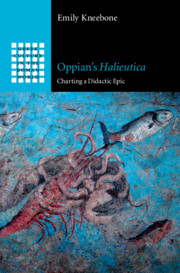Book contents
- Oppian’s Halieutica
- Greek Culture in the Roman World
- Oppian’s Halieutica
- Copyright page
- Epigraph
- Contents
- Acknowledgements
- Introduction: On Fishing
- Part I Didactic Poetry
- Part II Morality at Sea
- Part III Humans and Animals
- Chapter 7 Epic Similes
- Chapter 8 Analogical Animals
- Chapter 9 Humans and Other Animals
- Part IV The World Is a Sea
- Bibliography
- Subject Index
- Index Locorum
Chapter 7 - Epic Similes
from Part III - Humans and Animals
Published online by Cambridge University Press: 24 September 2020
- Oppian’s Halieutica
- Greek Culture in the Roman World
- Oppian’s Halieutica
- Copyright page
- Epigraph
- Contents
- Acknowledgements
- Introduction: On Fishing
- Part I Didactic Poetry
- Part II Morality at Sea
- Part III Humans and Animals
- Chapter 7 Epic Similes
- Chapter 8 Analogical Animals
- Chapter 9 Humans and Other Animals
- Part IV The World Is a Sea
- Bibliography
- Subject Index
- Index Locorum
Summary
Analogy, this book argues, is the master trope of the Halieutica. The world of fish is illuminated through continual reference to other forms of life, both human and animal, and the poem demands that each be understood and evaluated against the other. Similes, metaphors, and comparisons pervade and structure the work, and the poet’s anthropomorphic language brings fish into the domain of the human, and vice versa. Metaphor and simile are figures constituted by subtle combinations of similarity and difference, however, and Part III of this book explores the ways in which the poem challenges its readers to determine the precise nature of the relationships it illustrates. Extended similes of course enjoy a privileged role in epic discourse, and Oppian frequently defines his didactic epic both through and against Homeric analogical practice, capitalising on the archaic poet’s interest in the similarities between human and animal life. Chapter 7 examines the extended similes of the Halieutica, focusing on the representation of fish in ‘battle’ as a mode of engagement with Iliadic narratives of war, as well as with wider questions about violence and power; Chapter 8 builds on this analysis to explore the manner in which the didactic poet draws on Homeric representations of the close relationship between human and non-human animals; Chapter 9 sets these debates in their contemporary contexts by exploring the poet’s radical blurring of the human–animal boundary.
- Type
- Chapter
- Information
- Oppian's HalieuticaCharting a Didactic Epic, pp. 209 - 251Publisher: Cambridge University PressPrint publication year: 2020

